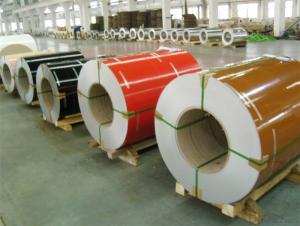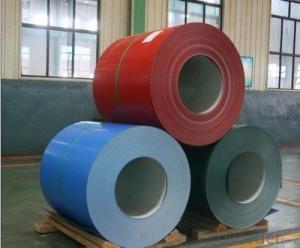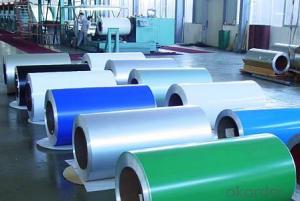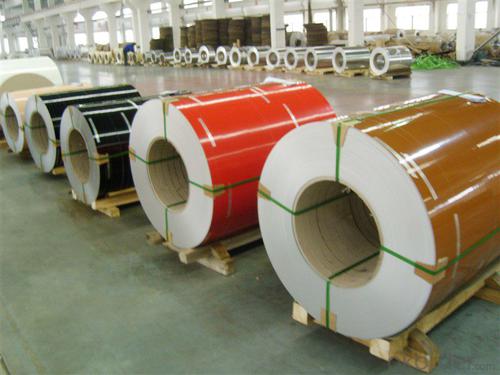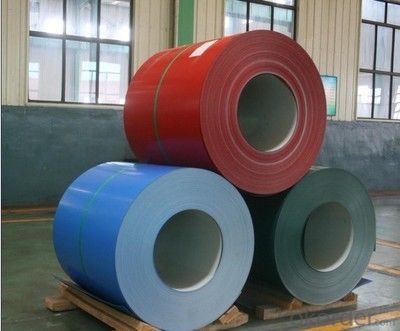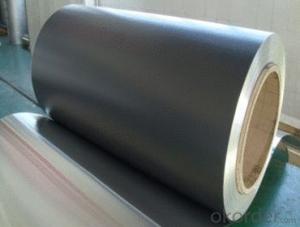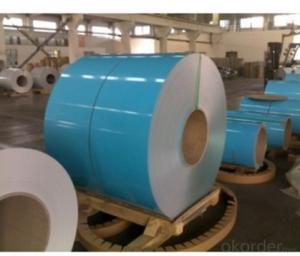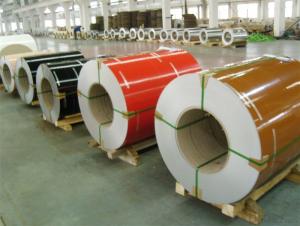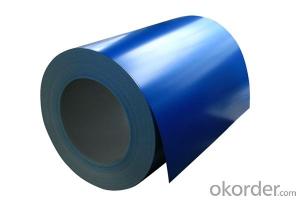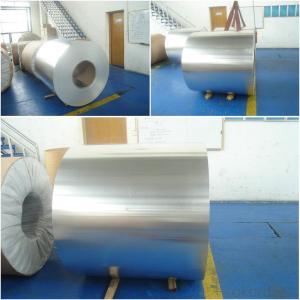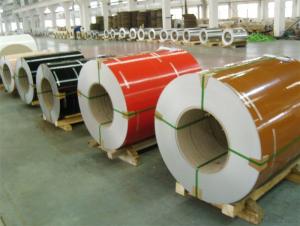Vinyl Clad Aluminum Coil - Prepainted Aluminum Coil with PVDF Best Quality
- Loading Port:
- Shanghai
- Payment Terms:
- TT or LC
- Min Order Qty:
- 8 m.t.
- Supply Capability:
- 5000 m.t./month
OKorder Service Pledge
OKorder Financial Service
You Might Also Like
Structure of Prepainted Aluminium Coil with PVDF Description:
Coated aluminum coil/sheet are of a wide range of colors, which gives wonderful appearance no matter in residential and commercial constructions of great exhibition centers.
The coated aluminum coil/sheet have been widely used in the fields of construction and decoration( garage doors, ceiling etc.), electronic appliances, lighting decoration, air-condition air pipes, sandwich panels and drainages etc.
Main Features of the AA5052 Aluminium Wire:
Wood grain-coated aluminum sheet with PVDF and can be used for many fields such as roofing, ceiling, curtain wall, lamp decoration, aluminum composite panel, honeycomb plate, doors and furniture.
Adapts aluminum coil and use best imported paint, composition contains 70% PVDF.
Technology is four coating and two baking.
Surface of products is smooth and dry.
Color is uniform.
Resist UV in air and corrosion.
Images of Prepainted Aluminium Coil with PVDF:
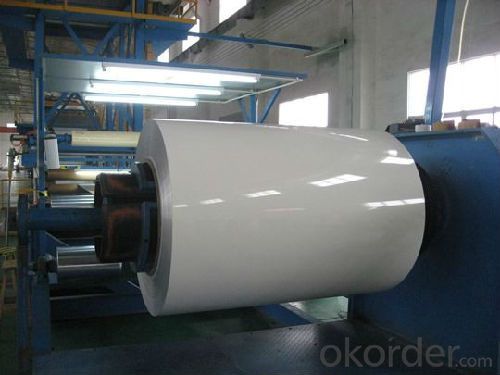
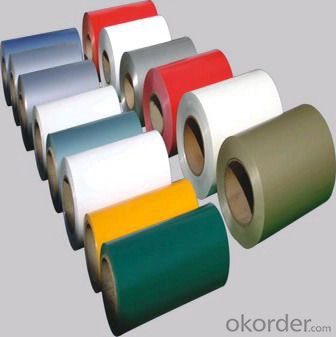
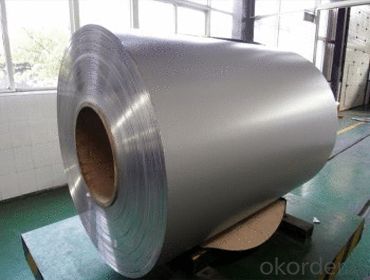
Prepainted Aluminium Coil with PVDF Specification:
| product | alloy | temper | size (mm) | ||
| thinckness | width | ||||
| aluminum coil/Color coated al coil/sheet with PE or Pvdf | 1070 1060 1050 1145 1235 1035 1100 1200 3A21 3003 3103 8011 | H18 H14 H16 H22 H24 0 | 1.0-4.0 | 60-1500 | |
FAQ of Prepainted Aluminium Coil with PVDF:
a) What's your process of this type aluminium?
Decoiler → Accumulator→Tension Leveller →Acid&Alkali Cleaner → Rinse →Conversion Treatment → Priming coater →Infrared Curing Oven →Main coater →Floatation Curing Oven →Strippable Film Applicator → Exit Accumulator →Recoiler
b)Now which countries do you export your goods?
Now we export to South East Asia,Africa, North America,South America ect.
- Q: Can aluminum coils be used in automotive suspension systems?
- Yes, aluminum coils can be used in automotive suspension systems. Aluminum coils are lightweight, durable, and have excellent corrosion resistance, making them suitable for use in suspension systems. They provide better handling, improved ride quality, and enhance fuel efficiency in vehicles.
- Q: This question asks about the various classifications of aluminum coil based on their properties and applications.
- <p>Aluminum coils are categorized into different grades based on their alloy composition and applications. The most common grades include 1000 series (99% pure aluminum), 3000 series (aluminum-manganese alloys), 5000 series (aluminum-magnesium alloys), and 6000 series (aluminum-magnesium-silicone alloys). Each grade has unique properties such as formability, strength, and corrosion resistance, which make them suitable for specific applications like construction, transportation, and packaging. The selection of the grade depends on the performance requirements of the end product.</p>
- Q: Are there any restrictions on the coil length of aluminum coils?
- Yes, there are restrictions on the coil length of aluminum coils. The coil length is limited by factors such as the manufacturing process, transportation constraints, and handling capabilities. These restrictions ensure that the coils can be efficiently produced, transported, and utilized in various applications.
- Q: What are the dimensions of an aluminum coil?
- The dimensions of an aluminum coil can vary depending on its intended use and manufacturing specifications. However, typical dimensions for an aluminum coil range from 0.2mm to 8mm in thickness and 200mm to 2000mm in width. The length of an aluminum coil can vary and is often determined by the customer's specific requirements. Additionally, the weight of an aluminum coil can vary depending on its thickness and dimensions.
- Q: How are aluminum coils priced in the market?
- Aluminum coils are priced in the market based on several factors. The primary factor influencing the price of aluminum coils is the current market price of aluminum. Since aluminum is a commodity, its price is determined by global supply and demand dynamics, as well as factors like production costs and currency fluctuations. Additionally, the cost of processing and manufacturing aluminum coils also affects their pricing. This includes expenses such as refining, alloying, rolling, and any other specialized processes required to produce the coils. The cost of energy, labor, and raw materials used in the production process also contribute to the overall pricing. Furthermore, market competition and the overall demand for aluminum coils influence their pricing. If there is high demand for aluminum coils and limited supply, the prices are likely to be higher. Conversely, if there is low demand and excess supply, prices may be lower. The size, thickness, and quality of the aluminum coils also play a role in determining their price. Thicker, larger, and higher-quality coils generally command a higher price due to the increased material and processing costs involved. Finally, transportation costs, import/export duties, and taxes imposed by different countries can also impact the pricing of aluminum coils. These additional costs are often factored into the final price of the product. In summary, the pricing of aluminum coils in the market is influenced by the current market price of aluminum, production costs, market competition, demand and supply dynamics, size and quality of the coils, as well as additional costs associated with transportation and taxes.
- Q: How to remove the fingerprint and glue residue on the color aluminum coil?
- Try to use essential balm. We often use the essential balm to remove glue residue on the stainless steel bowl and basin.
- Q: Are aluminum coils suitable for insulation applications?
- Indeed, insulation applications find aluminum coils to be a fitting option. The outstanding thermal conductivity properties of aluminum make it a widely preferred material for insulation purposes. Its ability to effectively deflect heat and cold renders it an efficient choice for insulating applications. What's more, aluminum coils boast lightweight construction, durability, and resistance to corrosion, rendering them suitable for a range of insulation requirements. Their installation is hassle-free, and they offer enduring insulation performance. In summary, aluminum coils emerge as an exceptional selection for insulation applications.
- Q: How do aluminum coils perform in coastal areas with high salt content?
- Aluminum coils generally perform well in coastal areas with high salt content due to their corrosion-resistant properties. The protective oxide layer on the surface of aluminum helps to resist the corrosive effects of salt air and prevent the formation of rust. However, regular maintenance and cleaning are still recommended to ensure optimal performance and longevity of the aluminum coils in such environments.
- Q: An aluminum bar 3.80 m long has a rectangular cross section 1.00 cm by 5.00 cm, what is the resistance and what is the length of a copper wire 1.50 mm in diameter having the same resistance?
- Resistance equals resistivity times length divided by cross-sectional area. R = ρ?l/A The resistivities at 20°C are aluminum ρ = 2.82×10??Ωm copper ρ = 1.72×10??Ωm So the aluminum bar with rectangular cross section has a resistance of R = ρ?l/(a?b) = 2.82×10??Ωm ? 3.8m / (0.01m ? 0.05m) = 2.1432×10??Ω The resistance of copper wire with circular cross section is given by R = ρ?l/(π?d?/4) = 4?ρ?l/(π?d?) Hence a wire of same resistance as the aluminum bar has a length of l = R?π?d? / (4?ρ) = 2.1432×10??Ω ? π ? (0.0015m)? / (4?1.72×10??Ωm) = 0.0220m = 2.2cm
- Q: Are aluminum coils resistant to vibration?
- Aluminum coils, typically, exhibit resistance to vibrations. Being lightweight and flexible, aluminum possesses the capability to absorb vibrations and alleviate their effects. Moreover, aluminum coils find extensive usage in crucial areas where vibration resistance holds significance, such as HVAC systems, automotive components, and electrical transformers. The commendable strength-to-weight ratio of aluminum further contributes to its capacity to endure vibrations without distortion or fracturing. Nevertheless, the precise degree of vibration resistance could vary depending on the distinctive design and construction of the aluminum coil.
Send your message to us
Vinyl Clad Aluminum Coil - Prepainted Aluminum Coil with PVDF Best Quality
- Loading Port:
- Shanghai
- Payment Terms:
- TT or LC
- Min Order Qty:
- 8 m.t.
- Supply Capability:
- 5000 m.t./month
OKorder Service Pledge
OKorder Financial Service
Similar products
Hot products
Hot Searches
Related keywords
